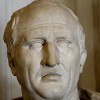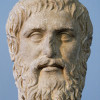“ other virtues are almost like bodily habits, and may be acquired in the same manner, but intelligence has a diviner life, and is indestructible, turning either to good or evil according to the direction given. Did you never observe how the mind of a clever rogue peers out of his eyes, and the more clearly he sees, the more evil he does? ”
Plato, The Republic. copy citation
| Author | Plato |
|---|---|
| Source | The Republic |
| Topic | intelligence evil |
| Date | |
| Language | English |
| Reference | |
| Note | Translated by Benjamin Jowett |
| Weblink | http://www.gutenberg.org/files/1497/1497-h/1497-h.htm |
Context
“Some persons fancy that instruction is like giving eyes to the blind, but we say that the faculty of sight was always there, and that the soul only requires to be turned round towards the light. And this is conversion; other virtues are almost like bodily habits, and may be acquired in the same manner, but intelligence has a diviner life, and is indestructible, turning either to good or evil according to the direction given. Did you never observe how the mind of a clever rogue peers out of his eyes, and the more clearly he sees, the more evil he does? Now if you take such an one, and cut away from him those leaden weights of pleasure and desire which bind his soul to earth, his intelligence will be turned round, and he will behold the truth as clearly as he now discerns his meaner ends.”
source


